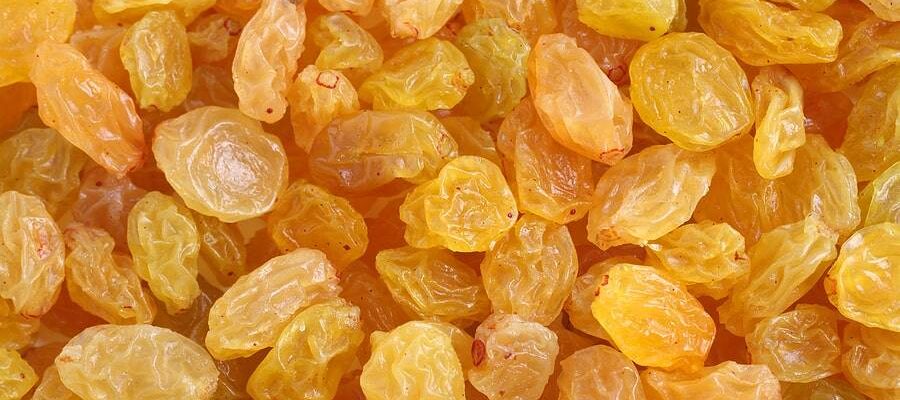
Iranian raisin
Iranian raisin
Iran is the third largest exporter of raisins in the world exporting 92,000 tons (7% global Consumption) of raisins worth around 70 million dollars annually. Iranian raisin
There are different varieties of Iranian Raisins; Sultana Raisins, Golden Raisins, Black Raisins, and Green Raisins.
The advantage of Iranian Raisins is principally its price and different methods of processing, and that’s the reason why Iranian Raisins are amongst the finest raisins in the world.
It is believed that humans discovered raisins when they happened upon grapes drying on a vine.
History books note that raisins were sun-dried from grapes as long ago as 1490 B.C. But several hundred years passed before it was determined which grape variety would make the best raisin.
In Iran, we can divide the variety of raisins into Seeded Raisins Unseeded Raisins, Green raisins, rice raisins, and currants. Green raisins and rice raisins are obtained from seedless grapes and Currant is provided from a variety of seeded grapes.
We explain the raisins preparation method because these names are related to the raisins preparation method as well as the kind of grapes, which is used in raisins production.
In Iran over 200 varieties of grapes have been named in different languages, but it is obvious that most of these names are related to one item that has found different names in different locations.Iranian raisin
Why do some raisins have a different color?
In Iran, Raisin colors vary by their drying process. For example, a dark purplish/black raisin or Black Raisin is sun-dried. A light to medium brown raisin or Sultana Raisin is dried under the shade.
A golden to bright yellow raisin is dried under shade and is also treated with sulfur dioxide to retain color and is called a Golden Raisin or Golden Bleached Raisins. Green Raisin is green but if sulfur is added the color will have a yellowish-green color to it. Iranian raisin
The processed raisins are prepared from clean, sound, dried grapes; are properly stemmed and cap stemmed except for cluster or uncap stemmed then the raisins are sorted and cleaned.
A 330 >= B 331-400 > C 500
Size pcs/100gr
– Pieces of stem %10
– Seeded %1
– Cap stem sum length/kg < 10cm
– Sugared %5
– Discolored, damaged, or moldy raisins %5
Provided these limits are not exceeded:
– Damaged %5
– Moldy %3
– Substandard Development and Undeveloped %2.5
– Foreign Materials: Stone 1pcs/10kg
– Percentages of moisture %16
– Percentages of unclean max %5
Raisins are the original candy-nature’s candy. They are one of the most nutritious dried fruits in the world. Raisins are cholesterol-free, low in sodium, and totally fat-free. They provide many necessary vitamins and minerals, including iron, potassium, calcium, and certain B vitamins. Raisins are a good source of fiber and are rich in antioxidants. Raisins are 70% pure fructose (a natural form of sugar), which is easily digested for quick energy.
Iranian raisin
Iran is the third largest exporter of raisins in the world exporting 92,000 tons (7% global Consumption) of raisins worth around 70 million dollars annually. Iranian raisin
There are different varieties of Iranian Raisins; Sultana Raisins, Golden Raisins, Black Raisins, and Green Raisins.
The advantage of Iranian Raisins is principally its price and different methods of processing, and that’s the reason why Iranian Raisins are amongst the finest raisins in the world.
It is believed that humans discovered raisins when they happened upon grapes drying on a vine.
History books note that raisins were sun-dried from grapes as long ago as 1490 B.C. But several hundred years passed before it was determined which grape variety would make the best raisin.
In Iran, we can divide the variety of raisins into Seeded Raisins Unseeded Raisins, Green raisins, rice raisins, and currants. Green raisins and rice raisins are obtained from seedless grapes and Currant is provided from a variety of seeded grapes.
We explain the raisins preparation method because these names are related to the raisins preparation method as well as the kind of grapes, which is used in raisins production.
In Iran over 200 varieties of grapes have been named in different languages, but it is obvious that most of these names are related to one item that has found different names in different locations.Iranian raisin
Why do some raisins have a different color?
In Iran, Raisin colors vary by their drying process. For example, a dark purplish/black raisin or Black Raisin is sun-dried. A light to medium brown raisin or Sultana Raisin is dried under the shade.
A golden to bright yellow raisin is dried under shade and is also treated with sulfur dioxide to retain color and is called a Golden Raisin or Golden Bleached Raisins. Green Raisin is green but if sulfur is added the color will have a yellowish-green color to it. Iranian raisin
The processed raisins are prepared from clean, sound, dried grapes; are properly stemmed and cap stemmed except for cluster or uncap stemmed then the raisins are sorted and cleaned.
A 330 >= B 331-400 > C 500
Size pcs/100gr
– Pieces of stem %10
– Seeded %1
– Cap stem sum length/kg < 10cm
– Sugared %5
– Discolored, damaged, or moldy raisins %5
Provided these limits are not exceeded:
– Damaged %5
– Moldy %3
– Substandard Development and Undeveloped %2.5
– Foreign Materials: Stone 1pcs/10kg
– Percentages of moisture %16
– Percentages of unclean max %5
Raisins are the original candy-nature’s candy. They are one of the most nutritious dried fruits in the world. Raisins are cholesterol-free, low in sodium, and totally fat-free. They provide many necessary vitamins and minerals, including iron, potassium, calcium, and certain B vitamins. Raisins are a good source of fiber and are rich in antioxidants. Raisins are 70% pure fructose (a natural form of sugar), which is easily digested for quick energy.